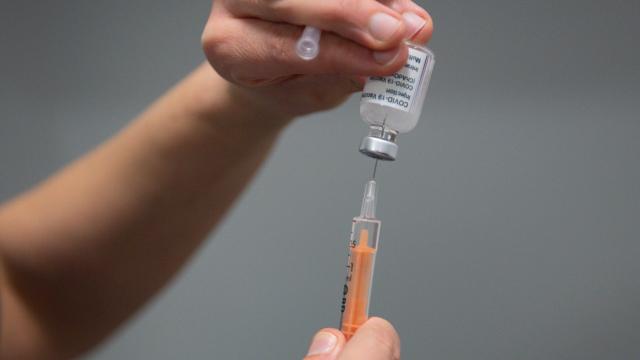New research suggests that the covid-19 vaccine developed by AstraZeneca and Oxford University will not only offer protection against the symptoms of the viral illness but also lower a person’s risk of transmitting the virus to others. Though scientists have been optimistic that this and other covid-19 vaccines would lower transmission risk, the new data is some of the first direct evidence to support that assumption.
Researchers at Oxford University in the UK released the data this week in a preprint paper for the Lancet. Preprints are preliminary research papers that have not yet gone through the formal peer review process, so any conclusions have to be viewed with some added caution. Regardless, the findings from their study — an analysis of longer-term data from clinical trials of the vaccine in the UK and Brazil — do appear to be encouraging.
For one, the results suggest that even a single dose of the Oxford/AstraZeneca vaccine can be 76% effective at preventing illness from the coronavirus 21 days after receiving it (it’s thought to take 21 days for the immune system to build up an effective response against the virus). Importantly, the effectiveness didn’t seem to drop up to three months later. The effectiveness of a two-dose regimen three months out was slightly higher, at about 82%. It’s possible, the researchers theorise, that doses three months apart may be the optimal schedule, since effectiveness was lower in those who received the doses only six weeks apart. As other research has shown, there were no coronavirus-related hospitalisations found in those vaccinated after 21 days, and the vaccine was well-tolerated.
[referenced id=”1668653″ url=”https://gizmodo.com.au/2021/02/a-volunteer-run-website-helps-you-find-a-vaccine-appointment-in-new-york-citys-online-maze/” thumb=”https://gizmodo.com.au/wp-content/uploads/2021/02/01/l1qmcylsqf8395kqubyq-300×169.jpg” title=”A Volunteer-Run Website Helps You Find a Vaccine Appointment in New York City’s Online Maze” excerpt=”It’s no secret that New York City, like many other places in the U.S., has been having a hard time with covid-19 vaccine distribution. One of the problems is its messy online sign-up website, which some city officials have denounced as “complex, burdensome, and buggy.” Officials said that this would…”]
The longevity of the protection offered by a single dose is especially reassuring, because the UK has allowed doctors to delay giving people the second dose for up to 12 weeks, or about three months, in order to stretch out the limited vaccine supply. Some scientists had worried that a delayed-dose strategy would lead to weakened or short-lasting protection for some, and countries including the U.S. have so far not chosen to follow the UK’s lead for their authorised vaccines, citing a lack of evidence for its safety. Though other data should be collected to confirm this trend, including from other vaccines with a two-dose course, it’s a sign that a delayed dose may not be too risky after all, at least for the Oxford/AstraZeneca vaccine.
Many scientists have been careful to note that these vaccine trials have so far only clearly shown that they’re effective at preventing illness from the virus, not at preventing transmission from a vaccinated person to an unvaccinated person. Yet other experts have argued that it would be very unlikely for a vaccine to lower the risk of the former but not the latter. Though there has been some early evidence that other vaccines, such as the Pfizer/BioNTech shot, do indeed lower transmission rates, the Oxford/AstraZeneca vaccine trials have been explicitly testing for that possibility since the start.
Volunteers in the UK trial were swabbed for the virus regularly through PCR testing. Compared to the volunteers who had received a placebo shot who later became infected and were identified through testing, those vaccinated who then contracted the virus had, on average, 67% lower levels of the virus in their system. Lower average viral loads in vaccinated people should mean that they’re less likely to transmit the virus if they become infected. Again, this is something that more data from other trials and vaccines will have to confirm. But if true, it would obviously be great news for ending the pandemic as quickly as possible.
[referenced id=”1668345″ url=”https://gizmodo.com.au/2021/01/the-second-wave-of-covid-19-vaccines-are-looking-really-promising/” thumb=”https://gizmodo.com.au/wp-content/uploads/2021/01/30/mxikivyxhauehvemdmzr-300×169.jpg” title=”The Second Wave of Covid-19 Vaccines Are Looking Really Promising” excerpt=”The end of the week has brought along a flurry of encouraging news on the second wave of covid-19 vaccines being tested in trials around the world.”]
There are still questions about how the spread of new virus variants will affect the effectiveness of these vaccines (so far, it’s thought to be unlikely that any variants will completely escape vaccine-provided immunity). Beyond the science itself, the supply and distribution of these vaccines continues to be sub-optimal, especially to lower-income countries. But there are signs of improvement there as well.
Last week, the EU authorised the emergency use of the Oxford/AstraZeneca vaccine, following the UK’s authorisation last December. The U.S. Food and Drug Administration is also expected to decide whether to authorise the Johnson & Johnson one-dose vaccine in the coming weeks (a decision on the Oxford/AstraZeneca vaccine will likely follow after the end of the U.S. trial in the spring). And just today, COVAX, an organisation backed by several intentional public health groups and the United Nations, announced its distribution forecast for the AstraZeneca/Oxford vaccine.
In the first and second half of 2021, it plans to distribute over 330 million doses to 145 countries, along with 1.2 million doses of the Pfizer/BioNTech vaccine. These shipments are only expected to cover about 3% of people in these countries, but it’s hoped that will be enough to cover some of the most vulnerable groups, such as health care workers.
